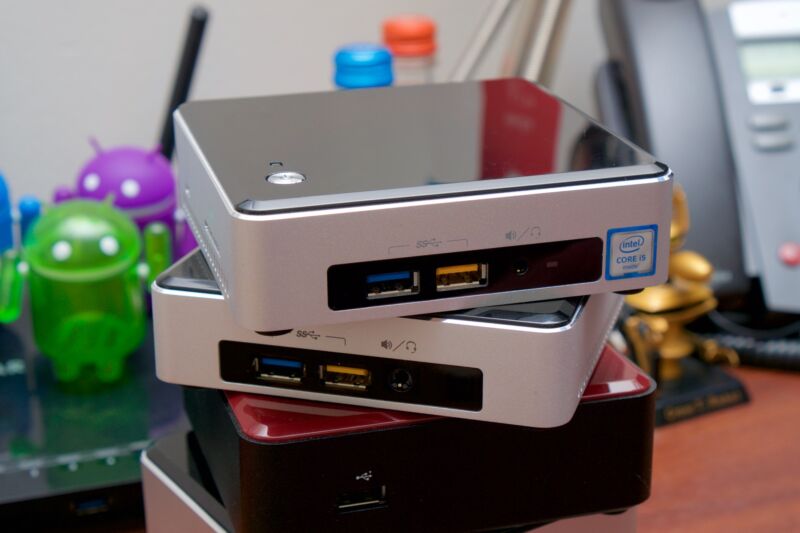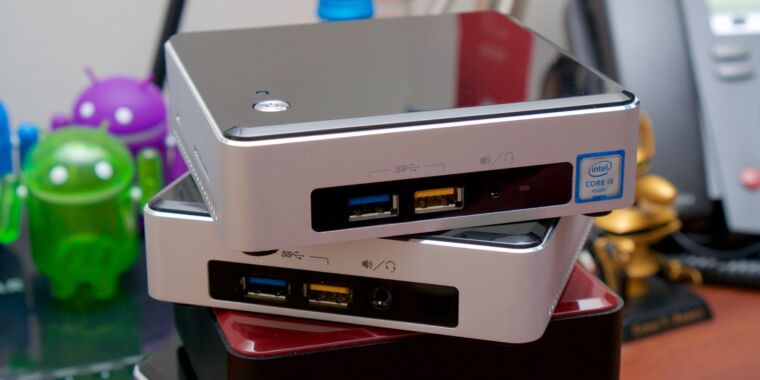
Andrew Cunningham
Since 2012, Intel has been designing and selling its own line of mini PCs. The Next Unit of Computing series (NUC – rhymes with bah – was always a weird name) has always been most closely associated with Mac mini-style desktops, but over the years it has grown into compact workstations and gaming systems, as well as mini servers with multiple Ethernet ports.
But Intel is apparently throwing in the towel with the NUC, according to a statement to The Verge earlier today.
Intel spokesperson Mark Walton said Intel had “decided to discontinue direct investments in the Next Unit of Compute (NUC) Business and turn our strategy around to enable our ecosystem partners to continue NUC innovation and growth.” This statement leaves some leeway – Intel could still work with partners to market NUCs or NUC-like products – but it seems that the days of Intel designing its own desktop computers are over.
Walton also said that Intel planned to continue with “ongoing support for NUC products currently on the market,” so it sounds like current NUC system owners will still need driver and BIOS updates and updates for the foreseeable future. should be able to get warranty support.
The first NUC, based on a third-generation Intel Core chip using the Ivy Bridge architecture, came out as Intel leaned hard on its then-new “ultrabook” initiative. In response to Apple’s MacBook Air, Intel gave PC companies part of a $300 million fund to develop new laptops that combined low-voltage (but relatively powerful) processors, fast solid-state storage, and thin-and-light designs that weren’t weighed down by obsolete parts such as built-in DVD drives. Twelve years later, you’ll still see the ultrabook designation floating around a bit, but MacBook Air-style laptops have taken over the portable PC market so thoroughly that an “ultrabook” and a “regular laptop” are more or less irrelevant in most cases. be distinguishable from each other.
The NUC was an attempt to bring the speed, size and low power consumption of an ultrabook to the desktop world, replacing square, ugly office desktops with something you could hold in the palm of your hand. NUC-style mini PCs haven’t taken over the desktop market in the same way that ultrabooks came to dominate the laptop market, but the NUC is still outlived by a large ecosystem of similar small PCs, many of which are ultimately cheaper and easier to make. buy than most NUCs were. Models include, but are not limited to, Dell’s Optiplex Micro, Lenovo’s ThinkCentre Tiny, HP’s ProDesk and EliteDesk Mini systems, Gigabyte’s Brix systems, some models from PC motherboard manufacturers such as Asus and ASRock, and Apple’s Mac mini and Mac Studio.
The end of the NUC is at least in part due to Intel’s recent financial troubles – the company has had a rough couple of quarters since the end of the pandemic-era PC boom, losing billions of dollars as its consumer, workstation and server companies all falter. The company has already instituted layoffs and slashed executive pay in response, and announced plans to sell its turnkey server business in April.
While Intel is still investing in a few product lines that aren’t processors — the company has said it’s still committed to its burgeoning GPU business — CEO Pat Gelsinger is betting the company’s future on its “IDM 2.0” strategy, in which Intel gives its chip manufacturing facilities to outside chip designers. This will put Intel in competition with Taiwan Semiconductor (TSMC), Samsung and GlobalFoundries, among others.

